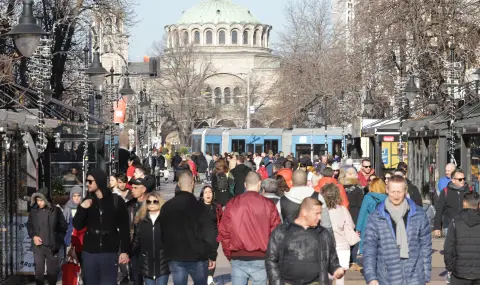The upswing starts in Sofia and slowly begins to cover the entire country. Many young and highly educated Bulgarians once left for the West, but are returning and gradually transferring their experience to the country they once left. This turnaround was caused by the technological boom that began in Sofia. A young middle class is already emerging that wants to live in their homeland in the way it knows from Western metropolises. These people have not only hopes and expectations, but also many ideas on how Bulgaria can be filled with life again, says Anne Wieger's report.
After the changes in Bulgaria, almost a third of the population set out to seek their happiness abroad. But now these people are returning - full of courage, ideas, creativity and enormous optimism. They are realizing their dream of a new life in their old homeland, says the NDR report, which presents several different destinies of returning Bulgarians.
Emilia and Alexander from HleBar
Emilia Vitanova and Alexander Derizhan returned to Bulgaria just when everyone else was leaving - 20 years ago. They started a business in Sofia immediately after finishing their studies in Munich. “When we lived in Germany, the difference between Sofia and Munich was brutal“, says Alexander, referring to the positive changes that have occurred in the Bulgarian capital since then. Emilia and Alexander created “HleBar“ - a bakery, café and restaurant, where special attention is paid to the composition of the products produced, says the NDR report. When they started, everyone around them predicted that they would fail – because there were times when Bulgaria was subject to the mob. But Emilia and Alexander were spared from such pressure and said to themselves – we will stay and fight.
The restorer of values
Boris Delchev is a restorer who worked for a long time in France. In front of the German media, he expressed regret that the old interesting buildings in Sofia are not valued enough and are in ruins – and they are part of the history and identity of the country. Currently, Delchev and his team are restoring a villa of a billionaire from Newport, making a curtain for his home cinema. Among Delchev's clients are also famous European aristocratic families and prominent designers such as Christian Louboutin and Philippe Starck, who have appreciated his work.
The author of the film Anne Viger says that upon returning from abroad, Bulgarians first worked mainly in call centers, then the technological boom occurred - and incomes increased noticeably.
The dream of ecological construction
From Sofia, viewers move to Dolni Rakovets, Radomir Municipality - a village that at first glance seems abandoned, like most Bulgarian villages. Ecological construction expert Dobromir Mashev has set out to restore the school, in the construction of which his great-grandfather participated. Dobromir's dream is to create an Institute of Ecological Construction in the building. He defines his intention as a huge responsibility - for the village, for the region, but also for the environment in all of Bulgaria. To work on the project, he returned a year and a half ago from Germany, where he lived for 20 years, and friends from there help him with his current endeavor. He constantly travels between the two countries and says that he feels at home in both places. “I can say that I am a hybrid who takes the energy and emotionality from Bulgaria, and the engineering thinking, precision and order from Germany.“ Regarding his vision for perfect construction, taking into account the environment, Dobromir told the German media: “Some may consider me crazy, but you have to be a little crazy, to be a visionary, to do something for the future“.
Black garlic from Dolni Rakovec
Again in Dolni Rakovec, where there are seven sources of mineral water, Vladimir Georgiev grows garlic – after the local, traditionally bred, was temporarily replaced by the Chinese. According to studies, mineral water softens the pungency of garlic, but only in old local varieties. Georgiev collected them from his grandmother's garden and already grows them on an area of 1.3 hectares. He founded his company in 2017, when he was 18. His parents worked in agriculture in Spain, and he wanted them to return. “We had no idea how to grow and cultivate garlic and at first we had big problems with weeds, but – you learn best from mistakes“, say Vladimir and his father. Today, the produce is sold mainly at farmers' markets in Sofia, and the grandmothers from the village help braid the garlic braids. Vladimir has meanwhile expanded his palette – he also produces black fermented garlic, as well as candies in the shape of cloves - everything is made by hand.
The economic changes are felt most strongly in the capital, explains the German public-law media outlet. And it adds, quoting Emilia Vitanova, that in Sofia many people now have enough money to afford high quality. “In Germany we are still known as the poorest country, and in the meantime I think that Bulgaria can be just as nice a southern country as Italy, Greece and Spain – with its incredible food and its beautiful nature“, says Vitanova.
They are changing life in Bulgaria
Bulgarians do not have particularly high expectations from politicians – they have voted too often in recent years. Now they take care of the organization of their lives themselves – where possible, NDR informs its viewers. Instead of complaining about Bulgaria's gloomy image in Europe, these people are simply changing it – explains the German public-law media outlet. "We have taken an example from the countries we have lived in and are filled with hope that we can lead a good life here too. I have a feeling that it is working," says Emilia Vitanova. Returnees bring a lot with them, but most of all their love for their homeland, which gives them so many opportunities to make their dreams come true.
Author: Anne Wieger ARD
